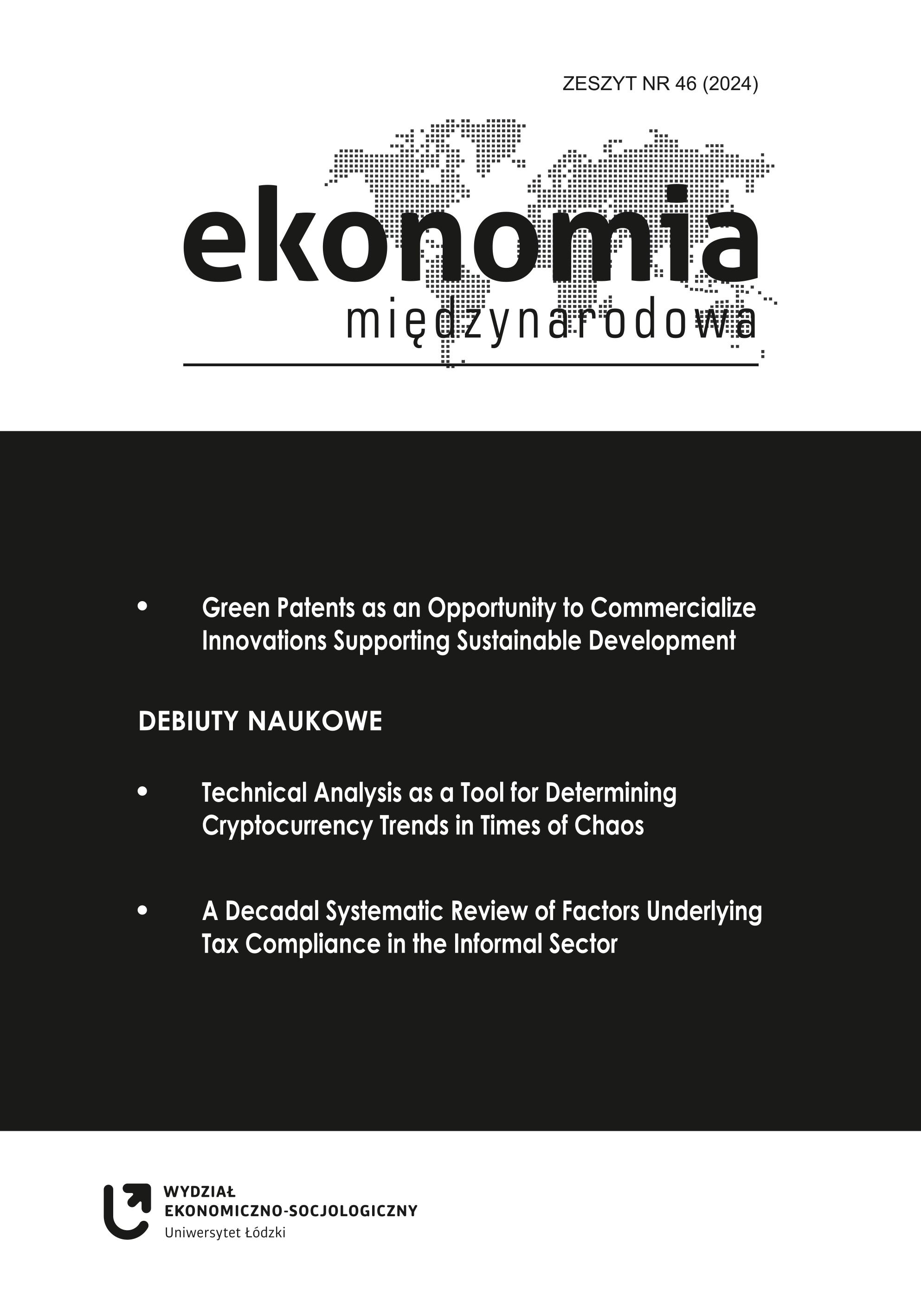Zielone patenty jako szansa na komercjalizację innowacji wspierających zrównoważony rozwój
DOI:
https://doi.org/10.18778/2082-4440.46.02Słowa kluczowe:
zielone technologie, zielone patenty, zrównoważony rozwój, komercjalizacjaAbstrakt
Zmiany klimatyczne i zrównoważony rozwój to obecnie jeden z kluczowych tematów zarówno dla decydentów jak i przedsiębiorstw. Narzędziami, które mogą pomóc w rozwiązaniu wielu problemów współczesnego świata są nowe technologie. Jednym z najważniejszych obszarów w procesie komercjalizacji nowych technologii jest ochrona własności intelektualnej. W przypadku zielonych technologii dobrą formą ochrony są zielone patenty. Autorka stawia tezę, że zielone patenty stanowią szansę na komercjalizację innowacji wspierających zrównoważony rozwój. Celem artykułu jest identyfikacja aktualnych trendów w tworzeniu technologii środowiskowych („zielonych technologii”) oraz identyfikacja obszarów, w których powstaje najwięcej nowych technologii wspierających zrównoważony rozwój.
Zastosowano zintegrowane podejście badawcze, łączące metody analizy deskryptywnej, komparatywnej i opisowej. Metody takie zastosowano, aby zidentyfikować obszary, w których powstają „zielone innowacje”. Dodatkowo, aby uzyskać kompleksowy obraz aktualnych trendów, wykorzystano metodę desk research. W ramach badań dokonano analizy literatury, dokumentów i danych statystycznych oraz zaprezentowano studium przypadku platformy technologicznej „WIPO Green” wspierającej transfer zielonych technologii na rzecz wdrażania zrównoważonego rozwoju.
Z przeprowadzonych badań wynika, że w wielu obszarach związanych z realizacją celów zrównoważonego rozwoju liczba patentów chroniących zielone technologie wzrasta. Ochrona nowych rozwiązań w postaci patentów nie rozwiązuje jednak problemu. Rozwiązaniem jest ich komercjalizacja, która otwiera możliwości dla realizacji celów zrównoważonego rozwoju.
Bibliografia
Białoń L., 2012, Aspekty ekologiczne działalności innowacyjnej, [in:] A.H. Jasiński, R. Ciborowski (eds.), Ekonomika i zarządzanie innowacjami w warunkach zrównoważonego rozwoju, Uniwersytet w Białymstoku Publishing House, Białystok.
Google Scholar
Bretas W.V., Cordeiro Morais A.S., Monteiro da Hora H.R., Azevedo Filho E.T., 2019, Knowledge Extraction on International Markets from Patent Bases: A Study On Green Patents, “Brazilian Journal of Operations & Production Management”. Vol. 16, pp. 698–705.
Google Scholar
DOI: https://doi.org/10.14488/BJOPM.2019.v16.n4.a14
Brown L. and Belcher T., 2023, Filing Patents Is Important for Green Energy Development, EE Times Europe, https://www.eetimes.eu/filing-patents-is-important-for-green-energy-development/ (accessed:19.01.2024).
Google Scholar
Chakrabarti T., 2014, Emergence of Green technologies towards sustainable growth, [in:] M.H. Fulekar, B. Pathak, R.K. Kale (eds.), Environment and sustainable development, Springer, New Delhi.
Google Scholar
DOI: https://doi.org/10.1007/978-81-322-1166-2_1
COM. Commission of The European Communities, 2002, Report from the Commission: environmental technology for sustainable development, Communication from the Commission. Corporate Social Responsibility: A business contribution to Sustainable Development, COM, Brussels, p. 2.
Google Scholar
Desheng L., Jiakui C., Ning Z., 2021, Political connection and green technology innovations under environmental regulation, ‟Journal of Cleaner Production”, Vol. 298. https://doi.org/10.1016/j.jclepro.2021.126778
Google Scholar
DOI: https://doi.org/10.1016/j.jclepro.2021.126778
Favot M., Vesnic L., Priore R., Bincoletto A., Moea F., 2023, Green Patents and green codes: How different methodologies lead to different results, ‟Resources, Conservation,& Recycling Advances”, Vol. 18. https://doi.org/10.1016/j.rcradv.2023.200132
Google Scholar
DOI: https://doi.org/10.1016/j.rcradv.2023.200132
Ghodsi M., Mousavi Z., 2024, Patents as green technology barometers: trends and disparities, https://wiiw.ac.at/patents-as-green-technology-barometers-trends-and-disparities-n-615.html (accessed: 19.01.2024).
Google Scholar
Green Technology Book. Solutions for Climate Change Mitigation, 2023, WIPO, Geneva, https://www.wipo.int/edocs/pubdocs/en/wipo-pub-1080-2023-en-green-technology-book.pdf (accessed: 19.01.2024).
Google Scholar
Hasna Z., Jaumotte F., Kim J., Pienknagura S., Shwerhoff G., 2023, Green Innovation and Diffusion: Policies to Accelerate Them and Expected Impact on Macroeconomic and Firm-Level Performance, International Monetary Fund, Issue 008. https://doi.org/10.5089/9798400256950.006
Google Scholar
DOI: https://doi.org/10.5089/9798400256950.006
Heshmati A., Tsionas M., 2023, Green innovations and patents in OECD countries, ‟Journal of Cleaner Production”, Vol. 418. https://doi.org/10.1016/j.jclepro.2023.138092
Google Scholar
DOI: https://doi.org/10.1016/j.jclepro.2023.138092
Jovanović M., Krstić B. & Berezjev L., 2022, Green patents as a determinant of sustainable economic growth, “Economics of Sustainable Development”, Vol. 6, No. 2, pp. 1–15.
Google Scholar
DOI: https://doi.org/10.5937/ESD2202001J
Juma B., 1994, Promoting International Transfer of Environmentally Sound Technologies: The Case for National Incentive Schemes, [in:] Green globe yearbook of international co-operation on environment and development, Oxford University Press, Oxford.
Google Scholar
Lavopa A., Menendez M., 2023, Who is at the forefront of the green technology frontier? Again it’s the manufacturing sector, UNIDO. Insights on industrial development 6, https://www.unido.org/sites/default/files/unido-publications/2023-10/IID%20Policy%20Brief%206.pdf (accessed: 2.02.2024).
Google Scholar
Lisowska-Bilińska E., 2020, WIPO GREEN – wsparcie dla zielonych innowacji i transferu technologii, “Kwartalnik Urzędu Patentowego RP”, nr 2/45, s. 3–6.
Google Scholar
Lourden Selvamani V., Dhilipan C., Arul P.G., Role of International Universities in Generating Green Technologies, “Journal of Intellectual Property Rights”, Vol. 25, pp. 23–28.
Google Scholar
Marczewska M., 2016, Źródła i mechanizmy powstawania ekoinnowacji w przedsiębiorstwach dostawcach technologii środowiskowych, Difin, Warszawa.
Google Scholar
Nitta I., 2005, Proposal for a green patent system: implications for sustainable development and climate change, “Sustainable Development Law & Policy”, Vol. 5, Issue 2: Business Responses to Climate Change, pp.60–65.
Google Scholar
Semenova A., Semenov K., Storchevoy M., 2023, One, Two, Three: How many Green Patents Start Bringing Financial Benefits for Small, Medium and Large Firms?, “Economies” 11(5), p. 137. https://doi.org/10.3390/economies11050137
Google Scholar
DOI: https://doi.org/10.3390/economies11050137
UnitedNations, 1992, United Nations Sustainable Development, Agenda 21, chapter 34, United Nations Conference on Environment & Development Rio de Janeiro, Brazil, 3–14 June. https://sustainabledevelopment.un.org/content/documents/Agenda21.pdf#page=305 (accessed: 14.01.2024).
Google Scholar
Waszak A., 2015, Ekoinnowacje elementem wdrażania polityki zrównoważonego rozwoju, Sozosfera.pl, Poznań.
Google Scholar
WIPO GREEN, 2024, https://www3.wipo.int/wipogreen/en/aboutus/ (accessed: 18.01.2024).
Google Scholar
WIPO Green platform, 2024, https://wipogreen.wipo.int/wipogreen-database/database (accessed: 14.01.2024).
Google Scholar
https://www.globaldata.com/esg/environment/patents/signals/ (accessed: 10.01.2024).
Google Scholar
https://www.oecd.org/env/indicators-modelling-outlooks/green-patents.html (accessed: 19.01.2024).
Google Scholar
https://www.techopedia.com/definition/29137/green-patent (accessed: 19.01.2024).
Google Scholar
https://www.wipo.int/classifications/ipc/green-inventory/home (accessed: 14.01.2024).
Google Scholar
Pobrania
Opublikowane
Jak cytować
Numer
Dział
Licencja

Utwór dostępny jest na licencji Creative Commons Uznanie autorstwa – Użycie niekomercyjne – Bez utworów zależnych 4.0 Międzynarodowe.









